Lights…
Camera…
Silence.
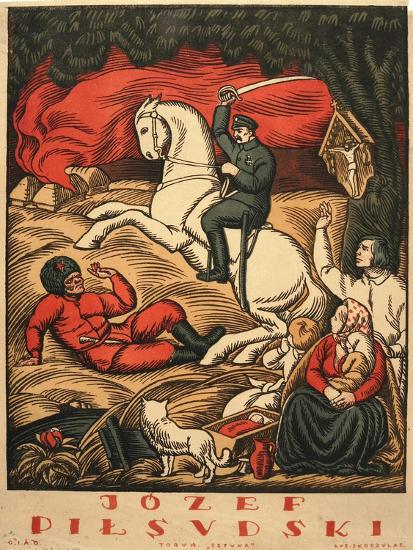
Europe falls quiet in the long shadow cast by World War 1. Poland stands alone between the Soviet hammer and the German anvil, born out of war with all of its neighbors after 300 years of foreign domination.
The nation now lies in malaise after a decade of political turmoil. But Joszef Pilsudski, a national hero, stole the reins of the nation from the Sejm to drive Poland into the 1930s as a virtuous democracy, sanitized of its malaises and ills.
Yet across the Vistula, the Oder-Niesse, Spree and the Rhine, the lights of Paris burn brightly. As victors in the great war, they’ve seen the worst fighting and disavowed it in favor of a resplendent peace.
The cabarets are busy and the taxis ride free but this resplendency and optimism for the future leaves them blind to developments abroad. The German war machine thunders to life again and aims itself towards defenseless neighbors: Austria, Czechoslovakia and soon, Poland.
The brewing storm seems so long ago, yet it resounds again in the bass drums of Hanba and Fouteurs de Joie. Two folk bands reinventing their genres for the modern ear in modern years, one cynic and the other cheerful.
Yet, who are they? What do they stand for?
And what makes their musical flavor so distinct from other similar bands?
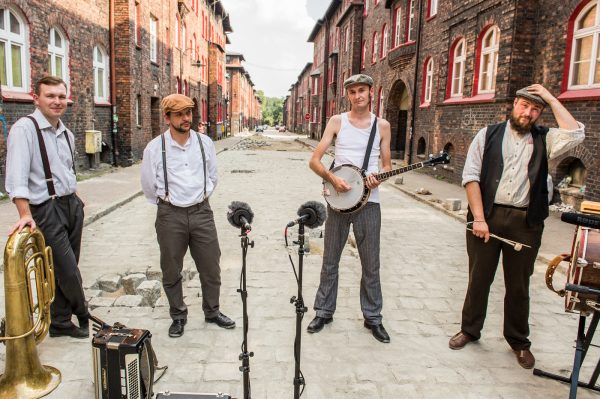
Hańba! (disgrace in Polish) is a post-folk-punk band from Krakow, with four members: Andrzej Zamenhof on the banjo and leading vocals, Ignacy Woland on the tuba and saxhorn, Tadeusz Krol on the accordion and clarinet, and Adam Solobewski on the baraban (a double headed bass drum) and backing vocals.
However, when researching their band’s official website, their blurbs seem confusing to read. Their birth dates are over a century old and where they were born doesn’t make sense if they’re Polish. Adam, the band’s drummer, is said to be born in Niemież/Nemėžis, a town that’s now in modern-day Lithuania.
Such confusion can be explained by the fact that the band exists in an alternate timeline, 80 years before our own. Where punk rock has its roots in interwar Poland, amid the most turbulent days of the Polish state.
The rage of the working class, amid the rise of fascism, xenophobia and antisemitism, gets channeled into their music as a firey, chaotic flavor of music unlike any other.
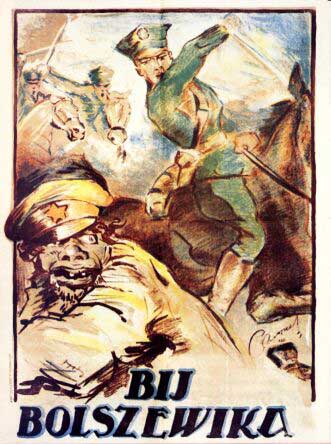
Their first proper release, self-titled, exemplifies this anger perfectly. Narutowicz, named for the first president of the second republic assassinated soon after taking office, mourns his death and condemns his killer as a traitor of the state. Bij Bolszewika, literally translated to “Beat the Bolshevik,” takes after a popular song during the Polish-Soviet War and rouses its listeners to attack them mercilessly with scythes, axes and guns. Niemcy Sie Zbroja, “Germans Are Coming,” whispers of a coming German invasion before springing into a frenzy once they storm the borders.
Their following releases, Beda Bic (r. 2017) and 1939 (r. 2019), continue on this growing paranoia and collapse of social order. Puste Samoloty, “Empty Planes,” muses about a war fought by the behalf of machinery, leaving humanity as victims to their own desire to tear eachother down.
Milcze, “I’m Silent,” on the other hand, mulls over the horrors and inhumane philosophies of war through the eyes of a volunteer during the Spanish Civil War.
It all culminates in Nikt Nam Nie Zrobil Nic, released in 2020 (1940 in their universe), where the war that many in Hanba’s universe had been fearing, finally came. Yet instead of the German whale swallowing Jonah, an alliance of Britain, France and Poland handily defeats them with Polish bombers over Berlin and the Reichstag in flames.
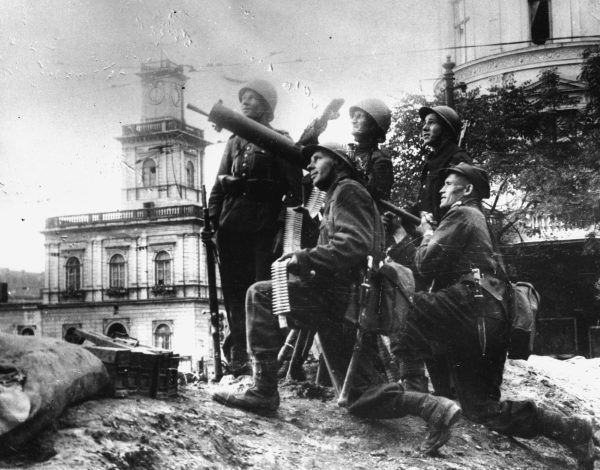
After the release of this album, Hanba did a heel turn away from the politically charged energy of their songs, seeing the sharp rise in popularity and all the incoming attention as seen with their latest album, Kryzys. This sudden modesty is exemplified by Refleksja, using a simple quatrain from Polish poet Jerzy Paczkowski to highlight the clericalism of the Second Polish Republic – too much holy water and too little plain soap.
All this cynic thinking contrasts strongly with the mirthful optimism of Les Fouteurs De Joie of France, comprising five members – Christophe Dorémus (double bass, guitar, musical saw), Nicolas Ducron (accordion, clarinet, sax, ukulele), Alexandre Leauthaud (accordion), Laurent Madiot (guitar, banjo, tuba, ukulele) and Tom Fish (guitar, vocals, banjo, percussion).
The band’s biography describes them as raging lions, singing primates and repeat-offender clowns all trying to capture joy and spread it to the world. In their aspirations, they’ve performed all over the world over a thousand times from Switzerland to Morocco to Belgium and Reunion with the same folk flair as Hanba.
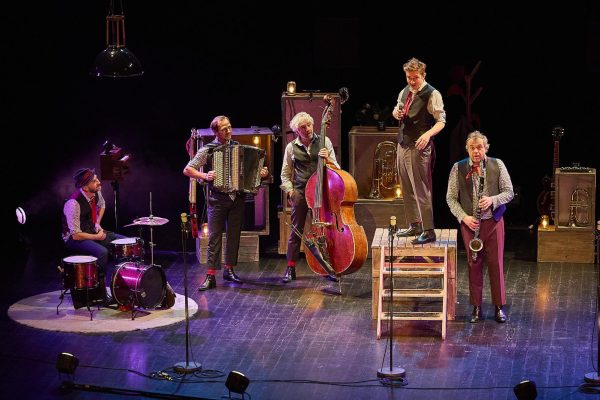
A good example of this is “Oh, Mon Patron” (“Oh, My Boss”), a rather upbeat song about the experiences of a host of factory workers under an indolent boss. Yet the industrial droning and rather midwestern banjo strumming underscore with a more dreary feeling before the vocals and tinny drum set come in.
The visuals for the accompanying music video has a lot of heart put into it with company photos, news clippings and calendars come to life to sing about the woes of their work.
Another song, “L’Andouillette,” the name of a type of coarse French sausage made from pig intestines, sees the band singing about soldiering through the rough patches of life. The accompanying music video sees the intrepid five playing at a bus stop, a flowery field, the inside of a restaurant, and a slaughterhouse while wearing mob caps and waterproof plastic coats.
Their cover of “Da Da Da,” by the German band Trio, renown for its barebones and repetitive composition, sees them playing in a pool, sporting swim trunks, sunglasses, goggles and a rabbit mask. The teaser for their live performance of their album “La Belle Vie,” The Good Life, sees the intrepid quintuplet take their theatrics to the next level as they take to the stage with. They humor the audience with small bouts of slapstick, dress-up and a healthy amount of acting, driving home their desire to spread joy to one and all.
So whether you need to let your rage burn or your heart abound in joy, settle down. Warsaw and Paris have you covered and are always open to welcome you with drum, brass and bravado.
Stay weird, Forest Hills.